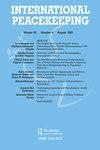Strategic Deployment of UN Political Missions to Replace UN Peacekeeping Operations: The Demand and Supply Sides of Transition Logic
IF 1.3
2区 社会学
Q2 INTERNATIONAL RELATIONS
引用次数: 1
Abstract
ABSTRACT Although United Nations peacekeeping operations (UN PKOs) produce positive outcomes for peace, some missions are strategically replaced by cheaper and smaller UN political missions (PMs). This article explores why certain peacekeepers are replaced by UN PMs and unpacks the exit strategy of UN PKOs. The logic of demand-side and supply-side perspectives is evaluated using data on the deployment of UN peacekeepers and UN PMs in post-civil war countries between 1993 and 2016. Signing comprehensive peace agreements (CPAs) increases the chances of UN PKOs being replaced by UN PMs because as the willingness to develop politically increases, the demand for civilian personnel after demilitarization also rises. On the supply side, as the preferences of the five permanent members of the UN Security Council concerning target states become more heterogenous, UN PKOs are more likely to be replaced by UN PMs because coordination problems encourage members to choose less burdensome missions.联合国政治特派团取代联合国维和行动的战略部署:过渡逻辑的需求和供给
摘要尽管联合国维和行动为和平带来了积极成果,但一些维和行动在战略上被成本更低、规模较小的联合国政治特派团所取代。本文探讨了为什么某些维和人员被联合国PM取代,并揭示了联合国PKO的退出策略。利用1993年至2016年间联合国维和人员和联合国PM在内战后国家的部署数据,评估了需求方和供应方视角的逻辑。签署全面和平协议增加了联合国维和行动被联合国PM取代的机会,因为随着政治发展意愿的增强,非军事化后对文职人员的需求也在增加。在供应方面,随着联合国安理会五个常任理事国对目标国的偏好变得更加多样化,联合国维和行动更有可能被联合国PM取代,因为协调问题鼓励成员国选择负担较轻的任务。
本文章由计算机程序翻译,如有差异,请以英文原文为准。
求助全文
约1分钟内获得全文
求助全文

 求助内容:
求助内容: 应助结果提醒方式:
应助结果提醒方式:


